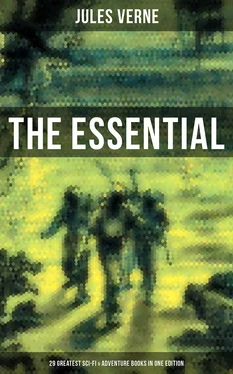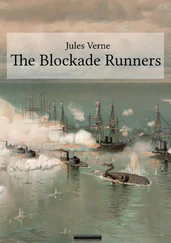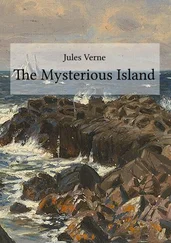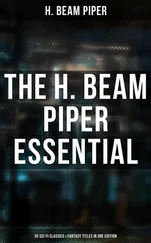“A sturgeon,” I cried; “a small sturgeon.”
The Professor eyes the creature attentively, and his opinion differs from mine.
The head of this fish was flat, but rounded in front, and the anterior part of its body was plated with bony, angular scales; it had no teeth, its pectoral fins were large, and of tail there was none. The animal belonged to the same order as the sturgeon, but differed from that fish in many essential particulars. After a short examination my uncle pronounced his opinion.
“This fish belongs to an extinct family, of which only fossil traces are found in the devonian formations.”
“What!” I cried. “Have we taken alive an inhabitant of the seas of primitive ages?”
“Yes; and you will observe that these fossil fishes have no identity with any living species. To have in one’s possession a living specimen is a happy event for a naturalist.”
“But to what family does it belong?”
“It is of the order of ganoids, of the family of the cephalaspidae; and a species of pterichthys. But this one displays a peculiarity confined to all fishes that inhabit subterranean waters. It is blind, and not only blind, but actually has no eyes at all.”
I looked: nothing could be more certain. But supposing it might be a solitary case, we baited afresh, and threw out our line. Surely this ocean is well peopled with fish, for in another couple of hours we took a large quantity of pterichthydes, as well as of others belonging to the extinct family of the dipterides, but of which my uncle could not tell the species; none had organs of sight. This unhoped-for catch recruited our stock of provisions.
Thus it is evident that this sea contains none but species known to us in their fossil state, in which fishes as well as reptiles are the less perfectly and completely organised the farther back their date of creation.
Perhaps we may yet meet with some of those saurians which science has reconstructed out of a bit of bone or cartilage. I took up the telescope and scanned the whole horizon, and found it everywhere a desert sea. We are far away removed from the shores.
I gaze upward in the air. Why should not some of the strange birds restored by the immortal Cuvier again flap their ‘sail-broad vans’ in this dense and heavy atmosphere? There are sufficient fish for their support. I survey the whole space that stretches overhead; it is as desert as the shore was.
Still my imagination carried me away amongst the wonderful speculations of palaeontology. Though awake I fell into a dream. I thought I could see floating on the surface of the waters enormous chelonia, preadamite tortoises, resembling floating islands. Over the dimly lighted strand there trod the huge mammals of the first ages of the world, the leptotherium (slender beast), found in the caverns of Brazil; the merycotherium (ruminating beast), found in the ‘drift’ of iceclad Siberia. Farther on, the pachydermatous lophiodon (crested toothed), a gigantic tapir, hides behind the rocks to dispute its prey with the anoplotherium (unarmed beast), a strange creature, which seemed a compound of horse, rhinoceros, camel, and hippopotamus. The colossal mastodon (nipple-toothed) twists and untwists his trunk, and brays and pounds with his huge tusks the fragments of rock that cover the shore; whilst the megatherium (huge beast), buttressed upon his enormous hinder paws, grubs in the soil, awaking the sonorous echoes of the granite rocks with his tremendous roarings. Higher up, the protopitheca - the first monkey that appeared on the globe - is climbing up the steep ascents. Higher yet, the pterodactyle (wing-fingered) darts in irregular zigzags to and fro in the heavy air. In the uppermost regions of the air immense birds, more powerful than the cassowary, and larger than the ostrich, spread their vast breadth of wings and strike with their heads the granite vault that bounds the sky.
All this fossil world rises to life again in my vivid imagination. I return to the scriptural periods or ages of the world, conventionally called ‘days,’ long before the appearance of man, when the unfinished world was as yet unfitted for his support. Then mydream backed even farther still into the ages before the creation of living beings. The mammals disappear, then the birds vanish, then the reptiles of the secondary period, and finally the fish, the crustaceans, molluscs, and articulated beings. Then the zoophytes of the transition period also return to nothing. I am the only living thing in the world: all life is concentrated in my beating heart alone. There are no more seasons; climates are no more; the heat of the globe continually increases and neutralises that of the sun. Vegetation becomes accelerated. I glide like a shade amongst arborescent ferns, treading with unsteady feet the coloured marls and the particoloured clays; I lean for support against the trunks of immense conifers; I lie in the shade of sphenophylla (wedge-leaved), asterophylla (star-leaved), and lycopods, a hundred feet high.
Ages seem no more than days! I am passed, against my will, in retrograde order, through the long series of terrestrial changes. Plants disappear; granite rocks soften; intense heat converts solid bodies into thick fluids; the waters again cover the face of the earth; they boil, they rise in whirling eddies of steam; white and ghastly mists wrap round the shifting forms of the earth, which by imperceptible degrees dissolves into a gaseous mass, glowing fiery red and white, as large and as shining as the sun.
And I myself am floating with wild caprice in the midst of this nebulous mass of fourteen hundred thousand times the volume of the earth into which it will one day be condensed, and carried forward amongst the planetary bodies. My body is no longer firm and terrestrial; it is resolved into its constituent atoms, subtilised, volatilised. Sublimed into imponderable vapour, I mingle and am lost in the endless foods of those vast globular volumes of vaporous mists, which roll upon their flaming orbits through infinite space.
But is it not a dream? Whither is it carrying me? My feverish hand has vainly attempted to describe upon paper its strange and wonderful details. I have forgotten everything that surrounds me. The Professor, the guide, the raft - are all gone out of my ken. An illusion has laid hold upon me.
“What is the matter?” my uncle breaks in.
My staring eyes are fixed vacantly upon him.
“Take care, Axel, or you will fall overboard.”
At that moment I felt the sinewy hand of Hans seizing me vigorously. But for him, carried away by my dream, I should have thrown myself into the sea.
“Is he mad?” cried the Professor.
“What is it all about?” at last I cried, returning to myself.
“Do you feel ill?” my uncle asked.
“No; but I have had a strange hallucination; it is over now. Is all going on right?”
“Yes, it is a fair wind and a fine sea; we are sailing rapidly along, and if I am not out in my reckoning, we shall soon land.”
At these words I rose and gazed round upon the horizon, still everywhere bounded by clouds alone.
Table of Contents
Saturday, August 15 . - The sea unbroken all round. No land in sight. The horizon seems extremely distant.
My head is still stupefied with the vivid reality of my dream.
My uncle has had no dreams, but he is out of temper. He examines the horizon all round with his glass, and folds his arms with the air of an injured man.
I remark that Professor Liedenbrock has a tendency to relapse into an impatient mood, and I make a note of it in my log. All my danger and sufferings were needed to strike a spark of human. feeling out of him; but now that I am well his nature has resumed its sway. And yet, what cause was there for anger? Is not the voyage prospering as favourably as possible under the circumstances? Is not the raft spinning along with marvellous speed?
Читать дальше












